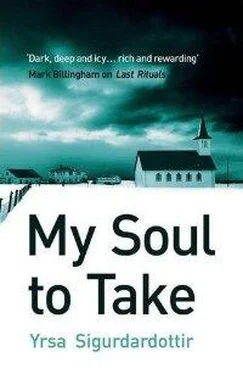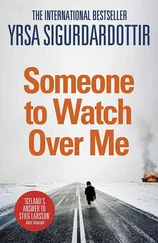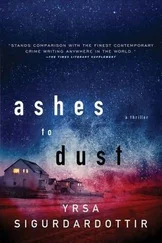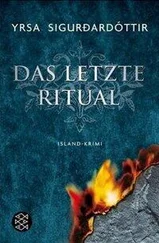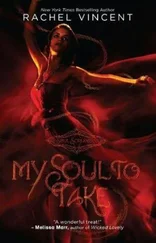“Could any of them have had anything against Birna?” Thóra asked.
“Not as far as I know,” Jónas said. “I know that she talked to the brother, but I believe it was all on very friendly terms. She was looking for local information from back when the farms were inhabited. I think she was hoping he had old maps or something.”
“And did she find any?” asked Thóra.
“No, I don’t think so,” Jónas replied. “I seem to recall that he didn’t have anything like that, or possibly he gave her something that turned out to be of no use. I know he let her look through the old stuff in the basement at Kirkjustétt, and on the other side at Kreppa.”
“Do you remember Birna ever mentioning the name Kristín?” Thóra asked. “Did she ask them about her?”
Jónas shook his head. “I don’t think so. Who’s this Kristín?”
“No idea,” Thóra replied. “I’m sure she has nothing to do with this. We found her name in—” Thóra just managed to stop herself before she mentioned Birna’s diary “Carved on a beam at the farmhouse. Maybe it’s just the name of a pet—a cat, a lamb even. We think it was written by a child.”
“Kristín’s quite a strange name for a cat,” Jónas said. “But I don’t remember Birna ever mentioning any Kristín, human or animal.”
They fell silent for a while. Thóra sipped the white wine Jónas had ordered for her, and contemplated their surroundings. The snug was cozy, with old-fashioned décor despite being in the modern annex.
“Are they local?” Thóra asked, pointing to the old photographs on the walls.
“No, I bought them at an antique shop. I have no idea who those people are. It was Birna’s idea.” Jónas looked around. “Quite a good one, I think.”
Matthew and Thóra nodded in agreement. “Maybe you should ask the family for permission to use some of the photos in the boxes down in the basement?” suggested Thóra. “There are several albums and a few in frames, and I think they show the former inhabitants. They might look quite charming here. I took most of them up to my room to take a better look at them, so I can show you if you like.”
Jónas shuddered. “No, thank you, but thanks for the offer. The less I know about them, the better.”
“Which photograph was it, exactly, the one you recognized the ghost from?” Thóra asked. “I’ve been through them and there are a number of candidates.”
“It was a framed photo of a young girl,” replied Jónas. “Blond. The spitting image of the creature that appeared in my room.”
“So it wasn’t a child?” asked Thóra. “I was under the impression it was a child.” The only framed picture that Thóra had come across was of Gudný, the one she had put on her bedside table. Gudný was not a child in the photo, but well into her teens.
“Child or not,” Jónas said, “a young girl, much younger than me—a child in my eyes.”
“And you’re positive that this happened?” interrupted Matthew. His expression spoke volumes. “You didn’t dream it?”
“No,” snapped Jónas. “That’s out of the question. I was tired, which explains a lot. When you’re in that state, the mind’s defenses are down and you’re more receptive to otherworldly phenomena. It happened, I promise you.”
“Okay, then,” Thóra said briskly. “Let’s leave that for the time being. How are you getting on with remembering where you were on Thursday evening?”
“Oh, that,” said Jónas. “Not so badly. I remember I was here when the séance was about to begin, then decided not to go to it. I was afraid of what might come out of it.”
“Afraid?” exclaimed Matthew. “Afraid of what?”
“Of what might be revealed. This place is turning out to be full of evil, and I don’t feel the need to have that confirmed by departed souls,” Jónas explained, as if it were a normal thing to say. “So I decided to go for a walk and regenerate my energy centers. There was a low fog, which is always conducive to that.”
Thóra spoke quickly, before Matthew had time to ask him about energy centers. “Did you meet anyone on your walk?”
“No,” replied Jónas. “No one. The weather was foul and it’s low season, so there wasn’t a soul about apart from me.”
“You’re forgetting Birna,” said Thóra. “And the murderer. They must have been out at the same time.” She looking imploringly at Jónas. “Please tell me you didn’t go down to the bay where Birna’s body was found.”
“No, I didn’t go there,” he said. “I only walked part of the way. I was pretty wound up; I was just roaming around, really. I’d called in a local guy to mend the drain under the drive, and that very day he’d dug up the road, then just gone home without finishing the job. The guests at the séance had to leave their cars by the main road and walk the rest. Two kilometers. I’m sure a lot of people turned back, and you can only imagine how irritated the other hotel guests were at discovering their cars were blocked in.”
“When was it mended?” asked Matthew.
“First thing the next morning,” Jónas said, still grumpy at the memory of the road digger. “He didn’t dare do otherwise after I gave him a piece of my mind.”
“So no cars would have been able to go between the hotel and the bay, where Birna was probably murdered that evening?” Thóra asked.
“No, that would have been impossible,” Jónas said. “There was a huge hole in the road.”
“Did you have your mobile phone when you went for the walk?” asked Matthew.
Jónas didn’t hesitate. “Definitely not. It emits waves that disturb me when I’m regenerating my energy centers.”
Matthew’s brow furrowed. He seemed about to ask Jónas to explain when Vigdís came over carrying some printouts.
“These are the lists you asked for,” she said, handing Jónas two sheets of paper. “These are the names of the guests staying at the hotel on Thursday and Friday nights, and these are the people with reservations who either didn’t turn up or canceled.” She flashed Thóra and Matthew a fake smile. “I must get back to reception to man the phones.” She strode off and Jónas called his thanks after her.
After scanning the lists, he handed them to Thóra. “This is a printout from the reservations system, although it’s probably not much help. I can’t imagine that one of the hotel guests would have murdered Birna. That seems quite unbelievable to me.”
“You never know,” Thóra admonished him. She began reading. It was not a long list. “Are these bookings quite low? There aren’t many names here.”
“No, not at all,” Jónas replied, looking wounded. “You can’t expect the hotel to be fully booked except right in the middle of summer. The tourist season is so short it can hardly be called a ‘season.’ I’ve been thinking of arranging events here this winter to attract people. Otherwise it will be rather bleak.”
Thóra nodded without taking her eyes off the list. “According to this, eight rooms were occupied on Thursday night and ten on Friday.”
“That fits,” said Jónas. “Of course, I don’t memorize the figures, but that’s probably about right.” He reached for his beer and took a sip. “This is organic beer,” he said as he put the glass back down and wiped the froth from his upper lip.
Thóra noticed Matthew’s eyebrows twitching. He sniffed suspiciously at his glass. Before he could grill Jónas about brewing methods, she showed Jónas the list and said, “Do you know any of the guests? Are there any regulars here, for example?”
“We opened so recently that we haven’t established a regular clientele unfortunately, but I must be able to remember them.” Jónas put his finger against the name at the top and began there. “Let’s see, Mr. and Mrs. Brietnes—no, they were an elderly couple from Norway and are very unlikely to be involved in the fatality.” He moved his finger down. “Karl Hermannsson—I don’t remember him; he seems to have stayed just the one night. But I remember this couple, Arnar Fridriksson and Ásdís Henrýsdóttir—they’ve been here before. They’re interested in what we’re doing and take lots of treatments. They can’t be involved in any way. Hang on. Who’s this? Thröstur Laufeyjarson?” Jónas thought to himself. “Oh, yes, the canoeist. He’s been paddling around here, training for a race. He’s booked until Wednesday. Very quiet, very moody. Could well be a murderer.”
Читать дальше
